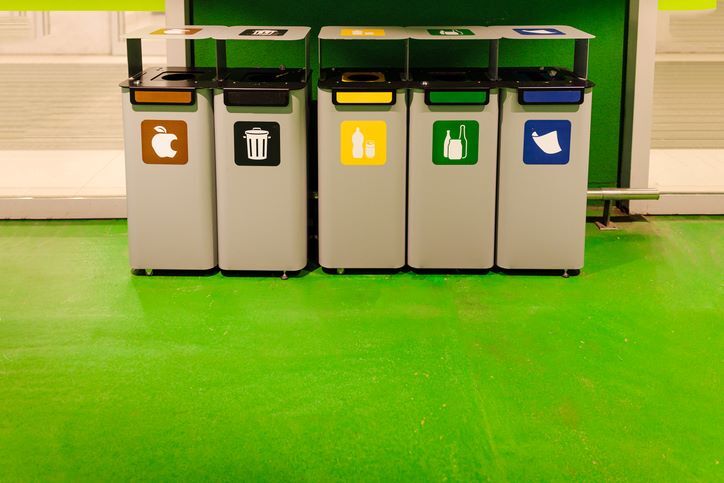How to Make Your Event More Sustainable in Georgia
A Practical Guide for Event Planning Professionals
.jpg)
Why Should Events Be Environmentally Friendly?
Read more about the impact that events can have on our climate and environment without careful planning.

How Can Events Be Environmentally Friendly?
By setting goals around sustainability, event planners can have a significant impact on waste and emissions.
.jpg)
What Are The Four Principles Of Event Sustainability?
The Events Industry Council outlines key principles to guide professional event planners in going green.

How to Reduce Waste at Special Events for Planners
These practical tips can help reduce waste of all kinds, from decor to food to unnecessary printed materials.

Considerations for Green Event Venue Selection
Choosing a venue that focuses on sustainability can make a real difference in the carbon footprint of your event.
.jpg)
Sustainability Considerations in Event Catering
From local sourcing to plant-based options, smart choices on catering can reduce waste and emissions.

Exhibiting Sustainably at Trade Shows and Conventions
This advice can help you reduce unnecessary waste at large trade shows and industry events.
.jpg)
Ideas for Green Weddings and Other Celebrations
From the decorations to the gifts to the food, this advice can make any celebration more sustainable.
.jpg)
Educating Event Attendees About Sustainability Actions
Getting attendee buy-in to sustainability efforts can help organizers achieve their goals of reducing waste and emissions.

What is the ISO Standard for Event Sustainability?
Learn about event sustainability guidelines from the International Organization for Standardization.

Resources for Sustainable Event Planners
Interested in learning more? Here are some additional resources to help with green event planning.
Why Should Events Be Environmentally Friendly?
Making events more sustainable is gaining momentum among event planners and attendees alike. From intimate weddings to large trade shows, events have the power to lead by example, showing how thoughtful, creative choices can lower environmental impact without sacrificing the guest experience.
Reducing energy use, cutting down on waste, and shrinking the carbon footprint of any gathering can reduce costs and leave a lasting, positive impression on everyone involved.
How Much Waste Do Events Produce?
Bringing people together at events can be the best way to celebrate or to get business done. Events can also produce tremendous amounts of trash and greenhouse gas emissions if they aren’t planned with care.
How significant an impact can events have on our planet? Here are just a few statistics about events, emissions, and waste:
- In the U.S., the event industry generates up to 1 million tons of waste annually. This includes food waste, single-use plastics, printed materials, and discarded event decor.
- The average event attendee produces over 4 pounds of waste per day, and half of that waste goes to landfills.
- It is estimated that 15% to 20% of event food is wasted, with large events generating tens of thousands of pounds of waste.
- A professional football game can result in 200,000 pounds of waste in a single day.
- A multi-day music festival can generate 100 tons of waste, with a small fraction recycled.
- An average trade show can produce 75,000 pounds of landfill waste per day.
- A 1,000-person event creates about 195 tons of CO2 emissions per day. That is the equivalent of consuming 411 barrels of oil for one event in one day.
- About 6,200 weddings take place each day in the United States, and the average wedding generates 400–600 pounds of waste and 63 tons of CO2 emissions.
Making your event more sustainable helps reduce these exponential impacts while also aligning with the growing “green” expectations of guests, sponsors, vendors, and event clients. Plus, embracing sustainability can lead to savings in the long run by reducing waste disposal costs, energy bills, and material expenses. It’s a win-win for the environment and event economics.

How Can Events Be Environmentally Friendly?
By leaning into creative solutions, event professionals may find that it can be surprisingly easy to plan events that produce less waste and fewer greenhouse gas emissions. Try these simple tips to begin:
- Start by putting sustainability and waste reduction in line with your other event goals. Whether your event is for entertainment, fundraising, community-building, celebration or information, including “Be as eco-conscious as possible” near the top of your event goals helps ensure that you measure each decision with sustainability in mind.
- Designate someone on the event team to focus on sustainability. This person will also help track successes and opportunities for improvement for future events.
- Look at each stage of your event planning through the lens of “How can I reduce waste and/or energy consumption here?”
- Get “Green Event” buy-in with all event partners: leadership, vendors, venues, and guests.
Incorporating sustainability into every step of your event planning can create meaningful, eco- and budget-conscious experiences that support your event goals, benefit attendees, and take better care of our planet.
Each decision towards sustainability matters. Every ounce of waste reduced counts. As people who gather other people together, we have a responsibility to our guests and the earth on which we gather them. There is no greater legacy in the events industry than to ensure our current events set the standard for sustainability in future events.

What Are The Four Principles Of Event Sustainability?
According to the Events Industry Council, the definition for event sustainability is “taking action towards preserving our natural environment; promoting a healthy, inclusive society; and supporting a thriving economy.” This event industry trade association encourages all players to join the green events effort and list the following Four Principles of Event Sustainability as:
- Event organizers and suppliers share responsibility for implementing and communicating sustainable practices to their stakeholders.
- Basic environmental practices include:
- Conservation of resources, including water, energy and natural resources
- Waste management
- Carbon emissions reduction and management
- Supply chain management and responsible purchasing
- Biodiversity preservation
- Basic social considerations include:
- Universal human rights
- Community impacts
- Labor practices
- Respect for culture
- Safety and security
- Health and well-being
- Sustainable events support thriving economic practices through:
- Collaboration and partnerships
- Local support, including small and medium enterprises (SMEs) and stakeholder participation
- Equitable economic impact
- Transparency
- Responsible governance
These Principles for Sustainable Events are meant to address the United Nations Sustainable Development Goals. To endorse the Principles for Sustainable Events, or to view the list of current endorsers, visit www.eventscouncil.org/Sustainability/Sustainability-Pledge.

How to Reduce Waste at Special Events for Planners
Events can create waste of all kinds, from uneaten food, giveaways, and decorations to unnecessary consumption of energy. Here are some tips to help reduce waste across the board at your next event:
Minimize waste at all stages:
- Use technology to avoid unnecessary in-person meetings.
- Reduce the amount of printing. Instead, the event team can:
- Share planning information digitally.
- Use digital invitations.
- Reuse décor.
- Reuse signage. Make signage less event or date specific, so it can be reused.
- Use apps for schedules, maps and tickets to show on phones.
- Utilize eco-friendly giveaways: Choose practical, sustainable swag like seed packets, reusable water bottles and containers, or digital gift cards.
- Avoid plastic.
- Consider alternatives to cut flowers.
- Use biodegradable or reusable name tags.
- Reuse prior event inventory whenever possible.
- Use compostable disposables.
- Ensure you have an accurate guest count with a menu tailored to their tastes.
- Partner with food recovery organizations for leftover edible food.
- Partner with waste management organizations to handle the recycling and the composting of food waste and compostable disposables.
- Provide water stations instead of bottled water.
- Educate your guests on the waste management protocols, and provide Sustainability Ambassadors who ensure that the proper waste goes into the proper waste stream. Have ambassadors positioned at waste stations, ready to correct improper waste disposal at the source, and/or ensure the waste is separated and managed for a clean composting and recycling stream.
- Clearly label recycling, compost, and landfill bins at each waste station, and ensure ample waste stations for your crowd. Planning to have 8 to 10 stations of 3 bins per station for every 1,000 guests at tradeshows, festivals, and similar events is recommended.
Reduce energy consumption:
- Select venues that are already committed to best practices in sustainability.
- Prioritize venues that use renewable energy sources and utilize LED lighting and other energy-efficient technologies to reduce energy consumption.
- Choose outdoor event electrical sources that can run on biodiesel or solar.
- Centralize events around public transportation and ease of access.
- Create hybrid events (a combination of in-person and virtual) to reduce unnecessary travel.
- Promote carpooling, provide bike racks, offer maps to EV charging stations, and arrange shuttle services.
- Use carbon offset programs to counterbalance travel-related emissions. Choose local efforts first.
- If you have out-of-town guests, suggest eco-friendly accommodation options.
- Evaluate your event’s carbon footprint and its effects on the surrounding environment frequently, including before, during, and after the event.
Build Your Sustainability Partnerships:
- Create a sense of purpose around sustainability in your messaging and promote why it's important to both the event host/leadership and you.
- Partner with local businesses that prioritize sustainability. Migrate from vendors/venues that aren’t seeking sustainability if you cannot convince them to join your efforts. When you find a great sustainability partner, share their information with your colleagues and other planners.
- Implement a sustainability pledge: Encourage vendors, sponsors, and attendees to commit to sustainable practices for the event.
- Get guest sustainability buy-in early on and keep them informed about your efforts to minimize waste.
- Track all of your sustainability metrics and share your successes and lessons with everyone after the event.

Considerations for Green Event Venue Selection
A venue’s commitment to sustainability can make a significant difference in your event’s overall impact, so ensuring they align with your green goals is essential. Look for locations with strong environmental policies—think renewable energy use, waste diversion programs, and water conservation measures. Keep in mind that outdoor venues can be great for reducing energy use, but also be mindful of the impact on local ecosystems.
What Questions Should Event Planners Ask a Venue About Their Practices?
- Do you have sustainability certifications such as LEED?
- Leadership in Energy and Environmental Design (LEED) certification indicates strong energy efficiency and sustainable building practices.
- What waste management and recycling options are available?
- Do you source energy from renewable sources?
- Some venues may source solar, wind, or geothermal energy.
- How do you minimize water and energy use?
- Examples include low-flow faucets, rainwater collection systems, water-efficient landscaping, airflow systems to reduce HVAC usage, and utilizing natural lighting to offset energy consumption.
- Do you have a sustainable food and beverage policy?
- Local sourcing, vegetarian options, and donating or composting leftovers all help reduce waste and greenhouse gas emissions.
- What transportation options do you recommend for attendees?
- Is the location accessible by public transportation? Does the location help minimize travel for most attendees?
- How do you handle leftover food and materials from events?
- What initiatives have you implemented to reduce your environmental footprint?
- Some venues may have enacted specific policies to reduce energy consumption and waste.
- How do you ensure sustainability initiatives have buy-in from all staff?
Cost Comparisons: Green Venues vs. Traditional Venues
A big myth about sustainable venues is that they cost more than traditional venues. While some eco-certified venues may have a slightly higher rental fee, they often help save money in other areas:
- Energy-efficient venues can lower electricity costs, reducing expenses on lighting and climate control.
- Built-in waste management programs eliminate the need to rent extra waste disposal services.
- Water-efficient venues often have lower utility costs, which can be reflected in rental fees or overall service costs.
- Green venues often feature eco-friendly décor and infrastructure, such as LED lighting and reusable materials, which reduces the need for costly rentals or extra setup.
The Bottom Line: Selecting a Green Venue shouldn’t hurt your bottom line.
Notable Green Event Venues in Georgia:
- The Classic Center (Athens)
- The Cobb Energy Performing Arts Center (NW Atlanta)
- Georgia Tech (Midtown Atlanta)
- Augusta Convention Center (Augusta)
- The Atlanta History Center (Buckhead)
- Gwinnett Environmental and Heritage Center (Buford)
- Serenbe (Chattahoochee Hills)
- Georgia International Convention Center (College Park)
- Emory University (Decatur)
- Chattahoochee Nature Center (Roswell)
- Savannah Convention Center (Savannah)
Spotlight on Mercedes-Benz Stadium (SW Atlanta)
With hundreds of events each year, amounting to millions of attendees, Mercedes-Benz Stadium has set the standard for event sustainability in Georgia. They have a full sustainability team and a Zero Food Waste program that includes a composting and recycling team that will go through each bag of waste to ensure it is properly streamed. All edible food is donated through a local food bank partnership, and the stadium has no plastic in use. They are showcased here to serve as a reminder that, if a huge complex event venue serving millions annually can accomplish a Zero Event Waste benchmark, any venue can.

Sustainability Considerations in Event Catering
Sustainable catering not only minimizes waste but also provides healthier, more ethical dining options. Sustainable catering tips include:
- Source locally: Work with caterers who use seasonal, organic, and locally grown ingredients. This reduces “food miles,” transportation fees, and spoilage costs.
- Offer plant-based and other sustainably sourced options: Reduce emissions by incorporating vegetarian and vegan menu items, which have a lower carbon footprint. Plant-based meals often cost 20–30% less than meat-heavy menus. Use sustainable proteins and organic ingredients where possible. (Learn more about the health and climate benefits of plant-based eating in the “How to Switch to a Plant-Based Diet toolkit.)
- Reduce packaging waste: Request bulk beverage and condiment dispensers instead of single-use bottles or packages. Choose compostable disposables whenever possible. Compostable tableware is sometimes cheaper than traditional plastic or ceramic dish rentals when factoring in cleaning fees.
- Reduce food waste: Offer smaller portions or plated meals instead of buffets. Buffet-style meals often lead to 30–50% more waste than plated meals. Make an accurate guest count, and understand their palates. Donate unused food to local food banks whenever possible.
- Compost food waste: Arrange for composting services to divert organic waste from landfills.
- Food Trucks: Look for food trucks that are aligned with your sustainability goals. They are a mobile kitchen, so it is easier for them to create food as needed instead of in advance based on attendee estimates.
Questions to Ask Caterers
- Do you offer locally sourced and organic menu options?
- Are your menus seasonal?
- Do you compost your food waste?
- How do you minimize food waste during preparation and service?
- Do you provide compostable or reusable serving materials?
- What options do you have for plant-based or sustainable seafood meals?
- Can you accommodate zero-waste or minimal-waste events?
- Do you partner with a service to pick up leftover food for redistribution?
Recommended Sustainable Caterers in Georgia:
- Trumps Catering (Athens)
- Bold Catering & Design (Atlanta)
- Affairs to Remember (Atlanta)
- Bhojanic Catering (Atlanta)
- Proof of the Pudding (Atlanta)
- Canoe Restaurant (Atlanta)
- Sun In My Belly (Atlanta)
- Simply Food Trucks (Atlanta - Coalition of food trucks that focus on sustainability.)
- The SolFood Kitchen (Augusta)
- Parsley’s Catering (Marietta)
- Thrive Catering (Savannah)
- Savannah Earth to Table Catering (Savannah)

Exhibiting Sustainably at Trade Shows and Conventions
Trade shows can generate enormous waste, but exhibitors can take steps to reduce their impact without increasing costs:
- Eco-friendly booth materials: Use modular, reusable displays instead of disposable options. Reusable booth materials may have a higher upfront cost but save thousands over multiple uses.
- Recycle exhibit materials by donating unused items to schools or nonprofits, which may qualify donors for tax deductions.
- Paperless marketing and lead generation: Use QR codes and digital business cards.
- Sustainable giveaways: Offer useful, eco-conscious swag like seed packets, reusable water bottles, bamboo products, plants, e-books, or items made from recycled materials.
- Energy-efficient lighting: Use LED lights for booth displays.
- Ship smart by consolidating to reduce packaging waste, emissions and freight costs.

Ideas for Green Weddings and Other Celebrations
Hosting sustainable celebrations doesn’t have to mean sacrificing style—or breaking the bank. Here’s how to host an eco-friendly, cost-effective wedding:
- Sustainable decor: Locally grown flowers cost 30-50% less than imported ones. Choose sustainable florals (potted plants, dried flowers, or donated arrangements). Opt for upcycled decorations. Be more creative and eco-conscious than confetti/balloons/rice.
- Ethical attire: Rent wedding dresses or purchase second-hand attire. Buying a pre-owned wedding dress can save up to 70% of the retail cost.
- Green gifting: Encourage donations to charities instead of physical gifts.
- Carbon-conscious travel: Offset emissions for destination weddings, and provide guests with green transportation options. Hosting in a central location can cut transportation costs and carbon footprints.
- Choose a green venue: Outdoor spaces often cost less and require minimal décor.
- Send digital invitations: Save money by using email instead of paper invites.
- Choose a plant-based menu: A vegan menu can be 20% to 30% cheaper than a traditional meat-heavy meal.
- Disposables: Opt for compostable or uniquely reusable dinnerware.
- Food waste: Ensure you understand your guest count and palate, and donate leftover food to local shelters.
Notable Sustainable Wedding Vendors in Georgia:
- Le Jardin Francais (Atlanta) – Specializes in sustainable floral designs.
- The Inn at Serenbe (Chattahoochee Hills) – Specializes in all things sustainability.
- The Sentimentalist (Atlanta) – Carries vintage and sustainable wedding attire.
- Affairs to Remember (Atlanta) – Luxury and sustainability in catering and décor.

Educating Event Attendees About Sustainability Actions
Sustainability works best if attendees engage with it. Encourage participation by incorporating ideas like:
- Sustainability pledges: Ask attendees to commit to simple eco-friendly actions.
- Transparency: Communicate your sustainability efforts, and ask them to join you.
- Clear signage: Explain waste sorting stations and eco-friendly initiatives.
- Gamification: Reward attendees for sustainable actions like carpooling, using refillable water bottles, or bringing their own cutlery/plates. Use social media or event apps to help engage and gamify sustainability.
- Partner with eco-friendly organizations to showcase their efforts and provide guest educational materials.

What is the ISO Standard for Event Sustainability?
The International Organization for Standardization provides the ISO 20121 standard as a framework for sustainable event management. It helps event organizers reduce environmental impact while considering social and economic factors. It is written to cover events of all sizes. Events that follow ISO 20121 guidelines:
- Set sustainability objectives and measure progress.
- Engage stakeholders in eco-friendly practices.
- Reduce waste, carbon emissions, and resource consumption.
- Prioritize inclusivity and social impact.
More information is available here: https://www.iso.org/standard/86389.html

Resources for Sustainable Event Planners
Planning a sustainable event in Georgia is easier with local resources. Here are some useful contacts:
- Atlanta Community Toolbank: Borrow/low-cost rental of event supplies/furniture.
- Better Earth: Compostable disposables supplier.
- Chattahoochee Riverkeeper: Provides resources for reducing water waste.
- CompostNow: Composting services.
- Drawdown Georgia: Hub for climate-friendly solutions.
- Georgia Grown: Resource for all things locally grown in Georgia.
- Georgia Organics: Local organic food resources.
- Georgia Recycling Coalition & Live Thrive/CHaRM Atlanta: Recycling partners
- Goodr & Second Helpings: Leftover usable food redistribution.
- ideaLand: Specializes in producing sustainable events.
- Local Governments: Many cities have an office of sustainability as a resource.
Meet Our Experts
This toolkit was written by the experts at ideaLand.
Sue Anne Morgan
Event Producer
ideaLand


